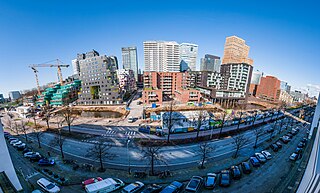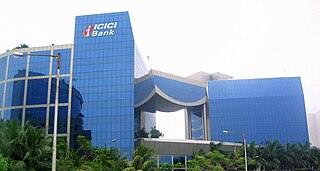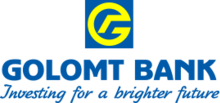The economy of Mongolia has traditionally been based on agriculture and livestock. Mongolia also has extensive mineral deposits: copper, coal, molybdenum, tin, tungsten, and gold account for a large part of industrial production. Soviet assistance, at its height one-third of Gross domestic product (GDP), disappeared almost overnight in 1990–91, in the time of the collapse of the Soviet Union. Mongolia was driven into deep recession.

The economy of the Netherlands is a highly developed market economy focused on trade and logistics, manufacturing, services, innovation and technology and sustainable and renewable energy. It is the world's 18th largest economy by nominal GDP and the 28th largest by purchasing power parity (PPP) and is the fifth largest economy in European Union by nominal GDP. It has the world's 11th highest per capita GDP (nominal) and the 13th highest per capita GDP (PPP) as of 2023 making it one of the highest earning nations in the world. Many of the world's largest tech companies are based in its capital Amsterdam or have established their European headquarters in the city, such as IBM, Microsoft, Google, Oracle, Cisco, Uber, Netflix and Tesla. Its second largest city Rotterdam is a major trade, logistics and economic center of the world and is Europe's largest seaport. Netherlands is ranked fifth on global innovation index and fourth on the Global Competitiveness Report. Among OECD nations, Netherlands has a highly efficient and strong social security system; social expenditure stood at roughly 25.3% of GDP.

The economy of Bahrain is heavily dependent upon oil and gas. The Bahraini Dinar is the second-highest-valued currency unit in the world. Since the late 20th century, Bahrain has heavily invested in the banking and tourism sectors. The country's capital, Manama is home to many large financial structures. Bahrain's finance industry is very successful. In 2008, Bahrain was named the world's fastest growing financial center by the City of London's Global Financial Centres Index. Bahrain's banking and financial services sector, particularly Islamic banking, have benefited from the regional boom driven by demand for oil. Petroleum is Bahrain's most exported product, accounting for 60% of export receipts, 70% of government revenues, and 11% of GDP. Aluminium is the second most exported product, followed by finance and construction materials.
Small and medium-sized enterprises (SMEs) or small and medium-sized businesses (SMBs) are businesses whose personnel and revenue numbers fall below certain limits. The abbreviation "SME" is used by many national agencies and international organizations such as the World Bank, the OECD, European Union, the United Nations, and the World Trade Organization (WTO).

Banco de Sabadell, S.A. is a Spanish multinational financial services company headquartered in Alicante and Barcelona, Spain. It is the 4th-largest Spanish banking group. It includes several banks, brands, subsidiaries and associated banks. It is a universal bank and specialises in serving small and medium enterprises (SMEs) and the affluent with a bias towards international trade.

ICICI Bank Limited is an Indian multinational bank and financial services company headquartered in Mumbai with a registered office in Vadodara. It offers a wide range of banking and financial services for corporate and retail customers through various delivery channels and specialized subsidiaries in the areas of investment banking, life, non-life insurance, venture capital and asset management.

Bangkok Bank Public Company Limited is one of the largest commercial banks in Thailand. Its branch network includes over 800 branches as of May 2024, within Thailand, with 32 international branches in 15 economies, including wholly owned subsidiaries in Indonesia, Malaysia, Singapore and China. Bangkok Bank has branches in London and New York to complement its Southeast Asian network.
The Bank of Mongolia, or Mongolbank, is the central bank of Mongolia. The main objective of the Bank of Mongolia is to ensure stability of the Mongolian tögrög. Within its main objective the Bank of Mongolia promotes balanced and sustained development of the national economy, through maintaining the stability of money, financial markets and the banking system.

Kosovo is a developing country with an economy that functions on the principles of the free market, with a large private sector. Kosovo is an upper-middle income economy according to the World Bank, and is a member of the World Bank and the International Monetary Fund. Its official currency is the euro.

İşbank, officially Türkiye İş Bankası, is a commercial bank in Turkey. Founded by the orders of Mustafa Kemal Atatürk in 1924, it is the first bank to go into operation in the Republic of Türkiye.

The Mongolian Stock Exchange is Mongolia's sole stock exchange. It is based in Ulaanbaatar and was established in January 1991 by the decree of the Mongolian Government to privatize state-owned assets.
Bank of Åland Plc is a Finnish commercial bank and banking group with over 700 employees and operations in Åland, Finland and Sweden. The bank was founded in 1919 and was listed on the stock exchange in 1942. Its president and CEO is Peter Wiklöf.

Following the Iranian Revolution, Iran's banking system was transformed to be run on an Islamic interest-free basis. As of 2010 there were seven large government-run commercial banks. As of March 2014, Iran's banking assets made up over a third of the estimated total of Islamic banking assets globally. They totaled 17,344 trillion rials, or US$523 billion at the free market exchange rate, using central bank data, according to Reuters.

People's Bank is a state-owned commercial bank in Sri Lanka. The second largest commercial bank in Sri Lanka. Established on 1 July 1961, it has its head-offices at Sir Chittampalam A. Gardiner Street in Colombo. The bank offer both retail and corporate banking services, with a network of 739 local branches, service centers and has an asset base of LKR 1.873 trillion (2019) with over 14 million customers. People's Bank received a high national long-Term Rating of AA+ by Fitch Rating. People's Bank most awarded state-owned company such as "Green Plus" "Carbon Conscious Award". People's Bank became Sri Lanka's best performing bank. Bank mainly targets small and medium enterprise. India has extended multiple credit lines and currency support to Sri Lanka, aligning with its policy of prioritizing neighboring nations and fostering strong relationships as a friendly neighboring country.

Tavan Bogd Group is a Mongolian conglomerate with 19 subsidiaries and 2 affiliates in operates across eight diverse sectors that include cashmere production, automobile and mining equipment trading, food production, financial services, international trade, tourism, property development, IT, and healthcare. Tavan Bogd Group is centrally positioned in the growth and advancement of the Mongolian economy.

The Mongolia Economic Forum is a non-profit, non-political and non-governmental organization in Mongolia that held its first annual conference in 2010. It provides a platform to explore collaborative opportunities across government and business, multilateral organizations, and the third sector, to implement development policies that help Mongolia achieve economic growth.
The State bank was established by government of Mongolia from the assets of 2 failed banks, Anod Bank and Zoos Bank, of Mongolia in November 24, 2009. It has about 201 to 500 employees. In July 2013, the government of Mongolia combined the 5th-largest bank, Savings Bank, with the State Bank after Savings Bank failed due to a large bad loan to its parent company, Just Group, and previous losses from acquiring Mongol Post Bank, at a cost to the state of $122 million. All 503 branches and 1.7 million customers were transferred to State Bank.

The Trade and Development Bank (TDB) of Mongolia (Mongolian: Худалдаа Хөгжлийн Банк, Khudaldaa Khögzhliĭn Bank) is a commercial bank located in Ulaanbaatar. It is the oldest, as well as one of the largest banks in Mongolia. It was founded in October 1990 and currently has a total of 97 branches throughout the country.

Banking and Finance Academy (BFA) was established in 2010 by eight shareholding commercial banks of Mongolia and the bank training institute which operated under Central Bank of Mongolia merged with it in 2012. The shareholding banks were Trade and Development Bank (TDB), Golomt bank, Khan bank, National Investment bank, Erel bank, Chingis Khan Bank, and the State Bank. The primary purpose of this Academy is to provide training services and certification for Mongolian banking and financial professionals and practitioners.

Khan Bank is a Mongolian bank that is one of the major commercial banks in Mongolia. As of 2024, the bank had 528 branches and 335 ATMs throughout the country. The Bank has the largest total assets in Mongolia, making it a key player in Mongolian finance sector.
















